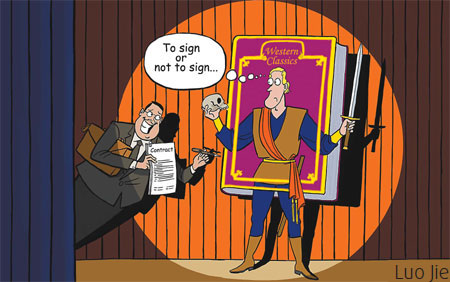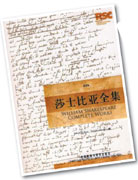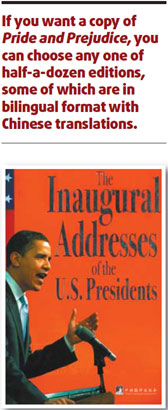
Say you're a lover of literary classics and are about to set off for China for an extended stay. You may want to have your favorite books at your fingertips.
Choice one: Lug a big trunk across the oceans. Choice two: Buy an electronic gadget, such as the Amazon Kindle, and download hundreds of books.
But if you don't want to strain your eyes, your back and your budget, here is the third choice: Buy the books in China - at a fraction of the cost in a Western country.
More and more classics are in print in China - and I'm not talking about Chinese translations. Chinese publishers are increasingly turning to classics in the English language to give readers a taste of authenticity.

If you want a copy of Pride and Prejudice, you can choose any one of half-a-dozen editions, some of which are in bilingual format with Chinese translations. The one by the Central Compilation & Translation Press (CCTP) has sold 5,500 copies since it came out in September last year, a better performance than an average novel by an unknown Chinese author.
China has hundreds of millions of people who are learning English and this has created a huge market for teaching and supplementary materials. But a select group also wants to read English for itself, for the beauty of the language and the undertones it carries.
Bai Yansong, a noted television anchorman, has reportedly said he no longer reads English-language books in translation.

No matter how good a translation, nuances can be lost in the process of converting one language to another. Besides, what's the point of spending years learning English and not be able to savor the works of Jane Austen or William Shakespeare the way they were penned?
But how big is this market? Nobody seems to have a clear idea.
Publishers are constantly caught in a dilemma of having to choose between authenticity and practicality. "Book lovers may spend several times more for an imported edition because they think ours is not bona fide enough," says Zheng Ying, an editor with CCTP.
So, they have adopted a page layout and typography that replicates the original books and kept the Chinese title so small that it's inconspicuous. "We thought of doing away with the Chinese title so that the only telltale sign it's published in China is the edition notice."
But college students do not really read classics, says Wang Qiuhai, a professor of English language at Capital Normal University. "They just learn of the titles. They may browse a little bit to get through certain courses."